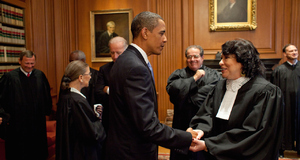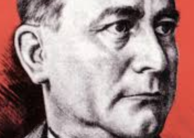The Obama PresidencyHow Eric Holder's Role as Attorney General Impacted the Obama Presidency
By
2015, Vol. 7 No. 02 | pg. 1/3 | » Attorney General Eric H. Holder Jr.’s recent resignation is not the first controversial issue to arise out of his nearly six-year career in the White House. Since his nomination process began, Holder’s career as Attorney General has been as groundbreaking as it has been inconsistent. His fierce defense of the Patient Protection and Affordable Care Act as well as his efforts to broaden civil rights have molded Holder’s legacy in the American Justice system as well as his impact on the shape of Obama’s presidency. While there is no doubt that Holder left a mark on the Obama’s presidency, it is unclear to what degree his legacy will make a lasting impact. This paper aims to quantify the effects that Holder’s legacy has had on the way Obama’s administration will be remembered in history. First, a brief discussion is undertaken about the role of Attorney General and what the position explicitly as well as implicitly entails. The roles discussed in the book Roles of the Attorney General of the United States will be used as a guide when analyzing Holder’s ability to fulfill the position.1 Then the analysis discusses Holder’s background and his successful career before his arrival on The Hill in 1997 as Deputy Attorney General during the Clinton administration. Next, some of Holder’s landmark work is analyzed using a model first created by Professor John O. McGinnis at Northwestern School of Law. According to McGinnis, an Attorney General wears various hats within his position. Each hat or model can be determined from an AG’s written opinions and include: the “independent authority” model, the “court-centered” model and “situational” model.2 It is through this lens that I attempt to classify and analyze Holder’s opinion model. In addition to the use of McGinnis’ model, I analyze some of the cases Holder has participated in, the work of his subcabinets and subordinates, as well as public statements made during press conferences or published by the Office of Public Affairs. All of these analyses provide further insight into the effect of Holder’s career on Obama’s governing and lead to a final conclusion summarizing Eric Holder’s legacy and its impact on Obama’s Presidency.Attorney General Eric Holder with President Obama in the wake of the shooting incident in Ferguson, MO (August 2014). A Brief History of the Role of US Attorney GeneralBefore Congress first established the position of Attorney General in 1789, the legal advisor to the President was a poorly paid part time position.3 President George Washington once said in regards to the position, “ The salary of this office appears to have been fixed at what it is from a belief that the station would confer pre-eminence on its possessor, and procure for him a decided preference of professional employment.”4 It was thought then, that the prestige and honor of the position provided enough compensation than a salary provided to the rest of the President’s cabinet members. Former Attorney General William Barr noted President Washington as further supporting this assertion, “ in offering the job to Edmund Randolph, the first Attorney General, George Washington suggested that it would help him attract clients.”5 By 1853, Congress had created an Office of Attorney General, providing a general office space and only $1,500 per year to pay for a clerk and office supplies.6 It was not until 1966 that the office had gained all administrative, supervisory and budgetary control over Federal litigation attorneys. Today, the role of the Attorney General of the United States has grown to become one of the largest within the executive branch of government. As the head of the Department of Justice, approximately 38 different divisions and offices fall under the leadership of the Attorney General and Deputy Attorney General, one of which is responsible for writing and publishing the legal opinions of the Attorney General, the Office of Legal Counsel.7 Although the Attorney General is typically thought of as an individual role, the mammoth size of the Department of Justice implies that the position is one of “collectivity.” Just as the President of the United States is thought of as both an individual and a collective administration, the same rule can be applied to Attorney General of the US.8 The Attorney General can be thought of having three masters: the President, Congress and the Courts. The Attorney General position is not explicit in the Constitution, and since the office was first created 1789 (it did not become the Department of Justice until 1870) the Attorney’s General actions must be granted through Congress or the Constitution. According to McGraw v. Dougherty, “…the functions of the Department of Justice, the powers and duties of the Attorney General and the duties of his assistants, are all subject to regulation by congressional legislation, and…the department is maintained and its activities are carried on under such appropriations as in the judgment of Congress are needed from year to year.”9 Additionally, the attorney general is required to make an annual report to congress. The AG’s other master, the US President, can be considered his most important client. When a President takes his oath into office, he swears, “ to take care that the laws are faithfully executed.” The AG as the “President’s Lawyer,” has a duty to ensure that the opinions he provides to the President and heads of executive departments satisfy that oath. Other responsibilities of the AG include, representing the Federal Government during all suits tried in the Supreme Courts, enforcing federal laws and supervising federal investigations and the federal penal system and directing the activities of the United States Attorneys and US Marshalls.10 The broad yet crucial roles of the AG do not lack its complications. One of the greatest challenges is the ability for the AG to balance his obligations to abide by the Constitution with the pressures of politics in the White House. Attorney General Edward Bates once said, “ The office I hold is not properly political, but strictly legal; and It is my duty, above all other ministers of state to uphold the Law and to resist all encroachments, from whatever quarter, of mere will and power.”11 However, President’s expect their AG’s to act as legal advocates rather than an impartial interpreter of constitutional law, further complicating the balance. The AG is then required to ensure the President does not come into any trouble for breaking Federal law but must also provide interpretations of Federal law that provides the President a legal framework in which he can take their desired action. Finally, the AG must answer to its third master: the Courts. The AG as amicus curiae, literally “a friend of the court,” derives its origins as early as Roman Law. Abbot’s legal dictionary defines amicus curiae: “a bystander who without having interest in the cause… makes suggestions on point of law or fact for the information of the presiding judge.”12 Although traditionally amicus curiae was limited to participate in court as a party neutral legal advisor, today the role has expanded. Amicus curiae is now thought to be partisan in its affairs in court. Acting as either an advocate of private or government interest, this expansion in understanding amicus curiae provides the AG opportunities to advance interests of the government through its intervention in the courts. One such example involves the AG’s ability to choose to represent certain parties in court. The AG could choose to represent one party privately but because defending that same party advances government interests, the AG serves as an advocate for both private and government parties. The consequences of this expansion in legal understanding and participation of amicus curiae is two fold. Although it grants the AG and executive branch substantial power over the formation of national policies, interest groups too gain some power in the form of “judicial lobbying.” With this broad understanding of this 200 year-old position, we can now begin to critically analyze how Eric Holder was able to fulfill the position of AG during his six-year tenure. Eric Holder: Personal Background and Nomination ProcessBorn January 21, 1951 in New York City to his Barbados native father and New Jersey native mother, Eric Holder was raised in Queens and studied high school at Manhattan’s Stuyvesant High School. From an early age, Holder took his academics seriously but maintained well rounded through his involvement with the high school basketball team. By fall of 1969, Holder was attending Columbia University and excelled in academia, mentored local kids, and became active in civil rights protests.13 After graduating, he entered the university’s law program and by the age of 25, Holder had begun his career as a prosecutor in the Justice Department as a part of the NAACP Legal Defense Fund. Columbia professor and former NAACP director Ted Shaw said of Holder, “ Clearly he was a star lawyer then, but Eric was down to earth, and he was one of the fellas, and still is in many ways.”14 In 1989, Holder met his wife Sharon Malone at a fundraiser for Concerned Black Men and the Coalition of 100 Black Women. Malone is best described by Holder himself: “My wife is a tremendously talented physician. But the best examples of her skills and qualities as a person are on display not in her doctor’s office but in our home in the form of our three children.” 15 The friendship between President Obama and AG Eric Holder began when the two were strategically seated next to each other at mutual friend Ann Walker Merchant’s dinner party in late 2004. Their similar backgrounds and experiences of having bi-racial parents, attending ivy-league schools and interests in basketball resulted in a budding friendship. When Obama decided to run for his first term, Holder immediately jumped on the opportunity to get involved with the campaign. Serving as an advisor on the campaign trail, the relationship between Holder and Obama continued to grow.16 With a background of almost 30 years as a prosecutor, judge and senior official within the Department of Justice, Holder was the obvious choice for Attorney General when Obama began his decision process on who to appoint to his cabinet. The position of Attorney General is nominated by the President and confirmed by the Senate. The AG can be removed by the President at anytime and is susceptible to impeachment by Congress and trial in the Senate for “treason, bribery and high crimes or misdemeanors.” During Eric Holder’s statement at his confirmation hearing for Attorney General in front of the Senate, he lists some of the major priorities he believes he must address if approved for the position. First and foremost, Holder describes his commitment to protecting the American people from terrorism stating, “Nothing I do is more important.”17 This statement may suggest more about the political climate and what had become a political norm since September 11, 2001 rather than the actual role of Attorney General. However, his following statement reveals his concerns over how the Bush administration addressed these issues within the political climate context. Holder states, “ I will work to restore the credibility of a Department badly shaken by allegations of improper political interference.”18 The implications here suggest that Holder would execute the position of attorney general under a more traditional understanding of amicus curiae adding, “Law enforcement decisions and personnel actions must be untainted by partisanship.”19 Holder also underlined the importance of the Justice Department’s role in protecting civil rights, making headway in protecting the environment, and ensuring fairness in the market place. Finally, Holder closed his statements to the Senate by discussing what he had learned through mistakes or faulty decisions he realized he had made during his career in hindsight. One such mistake was his debacle while serving as Deputy Attorney General during the Clinton administration. Holder sparked controversy after granting fugitive Marc Rich a Presidential pardon. Holder also mentioned the prosecution of corrupt public officials during his time at the Department of Justice. For all of these examples, Holder assures that the decisions he made were made with the Federal law as his guiding principle.20 The next part of the nomination process included extensive question and answering by members of senate about Holder’s stance on various political issues including gun control, torture, DNA regulations, the prosecution of Guantanamo detainees in military or civilian court systems amongst other controversial topics. Its these stances as well as published memos by AG Holder and The Office of Legal Counsel opinions that should be analyzed to gain further understanding of Eric Holder’s capacity as US Attorney General.Continued on Next Page » Suggested Reading from Inquiries Journal
Inquiries Journal provides undergraduate and graduate students around the world a platform for the wide dissemination of academic work over a range of core disciplines. Representing the work of students from hundreds of institutions around the globe, Inquiries Journal's large database of academic articles is completely free. Learn more | Blog | Submit Latest in Law & Justice |



















